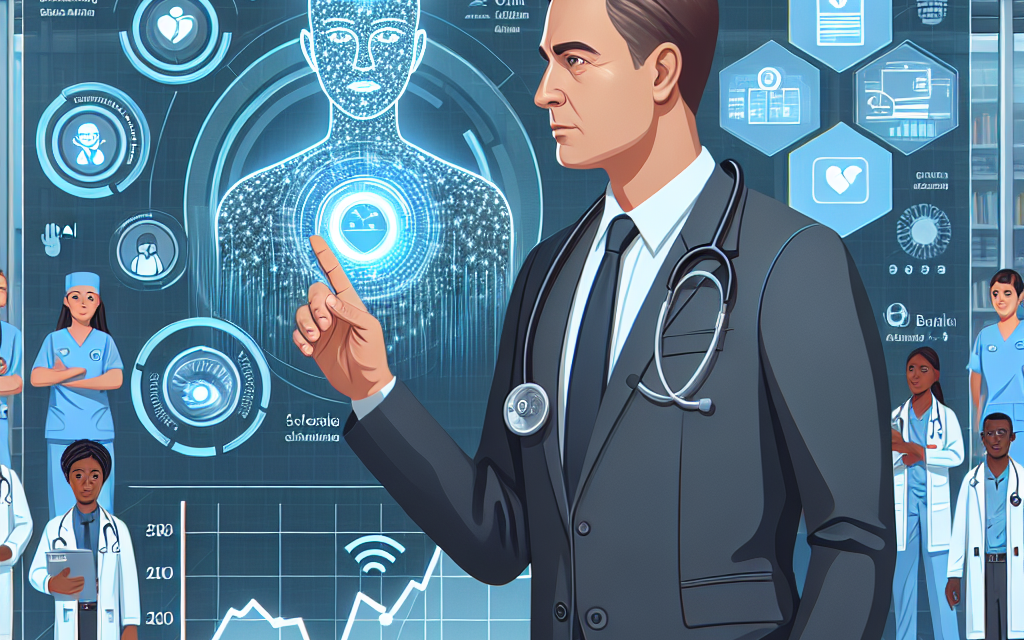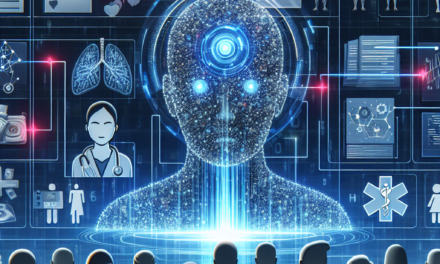Insights from the Chief AI Officer at Children’s National on Automating Clinical and Administrative Processes
In the rapidly evolving landscape of healthcare, the integration of artificial intelligence (AI) is transforming how clinical and administrative processes are managed. At the forefront of this revolution is the Chief AI Officer at Children’s National, who is leveraging AI to enhance patient care, streamline operations, and improve overall efficiency. This article delves into the insights shared by this leader, exploring the multifaceted impact of AI on healthcare, particularly in a pediatric setting.
The Role of AI in Healthcare Transformation
Artificial intelligence is not just a buzzword; it is a powerful tool that is reshaping the healthcare industry. The Chief AI Officer at Children’s National emphasizes that AI can significantly enhance both clinical and administrative processes, leading to better patient outcomes and more efficient operations.
AI technologies, such as machine learning, natural language processing, and robotic process automation, are being utilized to analyze vast amounts of data, predict patient needs, and automate routine tasks. This transformation is particularly crucial in pediatric care, where timely interventions can make a significant difference in patient outcomes.
- Data Analysis and Predictive Analytics: AI algorithms can analyze patient data to identify trends and predict potential health issues before they arise. For instance, by examining historical data, AI can help clinicians anticipate complications in children with chronic conditions.
- Natural Language Processing: This technology enables the extraction of meaningful information from unstructured data, such as clinical notes. By automating the documentation process, healthcare providers can focus more on patient care rather than administrative tasks.
- Robotic Process Automation: Routine administrative tasks, such as scheduling appointments and processing insurance claims, can be automated, reducing the burden on staff and minimizing human error.
These advancements not only improve efficiency but also enhance the quality of care provided to patients. The Chief AI Officer notes that the ultimate goal is to create a healthcare environment where technology supports clinicians in making informed decisions, thereby improving patient outcomes.
Enhancing Patient Care through AI
One of the most significant impacts of AI in healthcare is its ability to enhance patient care. The Chief AI Officer at Children’s National highlights several key areas where AI is making a difference.
Firstly, AI-driven tools can assist in diagnosing conditions more accurately and quickly. For example, machine learning algorithms can analyze medical images, such as X-rays and MRIs, to identify abnormalities that may be missed by the human eye. This capability is particularly beneficial in pediatrics, where early diagnosis can lead to more effective treatment plans.
Secondly, AI can personalize treatment plans based on individual patient data. By analyzing genetic information, lifestyle factors, and previous treatment responses, AI can help clinicians tailor interventions that are more likely to succeed for each child. This personalized approach not only improves outcomes but also enhances patient satisfaction.
- Telemedicine and Remote Monitoring: AI technologies facilitate telemedicine services, allowing healthcare providers to monitor patients remotely. This is especially important for children with chronic illnesses who may require frequent check-ups.
- Patient Engagement: AI-powered chatbots and virtual assistants can provide patients and their families with information and support, improving engagement and adherence to treatment plans.
- Clinical Decision Support: AI systems can provide real-time recommendations to clinicians based on the latest research and clinical guidelines, ensuring that patients receive the most up-to-date care.
These advancements are not just theoretical; they are being implemented in real-world settings at Children’s National. For instance, the hospital has developed AI tools that assist in the early detection of sepsis in pediatric patients, significantly improving survival rates.
Streamlining Administrative Processes with AI
In addition to enhancing patient care, AI is also revolutionizing administrative processes within healthcare organizations. The Chief AI Officer at Children’s National emphasizes that automating administrative tasks can lead to significant cost savings and improved operational efficiency.
One of the primary areas where AI is making an impact is in scheduling and resource allocation. Traditional scheduling methods can be time-consuming and prone to errors. AI algorithms can analyze patient demand, staff availability, and resource utilization to create optimized schedules that minimize wait times and maximize efficiency.
Moreover, AI can streamline billing and insurance processes. By automating claims processing and verifying insurance eligibility, healthcare organizations can reduce administrative burdens and improve cash flow. This is particularly important in pediatric care, where families may face financial challenges and require assistance navigating insurance complexities.
- Automated Documentation: AI can assist in generating clinical documentation, reducing the time clinicians spend on paperwork and allowing them to focus more on patient care.
- Data Management: AI systems can help manage patient records more efficiently, ensuring that information is easily accessible and up-to-date.
- Compliance and Reporting: AI can assist in monitoring compliance with regulations and generating reports, reducing the risk of penalties and improving overall governance.
By automating these processes, Children’s National has seen a reduction in administrative costs and an increase in staff satisfaction, as employees can devote more time to meaningful work rather than repetitive tasks.
Challenges and Considerations in AI Implementation
While the benefits of AI in healthcare are substantial, the Chief AI Officer at Children’s National acknowledges that there are challenges and considerations that must be addressed during implementation.
One of the primary concerns is data privacy and security. Healthcare organizations must ensure that patient data is protected from breaches and unauthorized access. This requires robust cybersecurity measures and compliance with regulations such as HIPAA.
Another challenge is the integration of AI systems with existing healthcare infrastructure. Many organizations have legacy systems that may not be compatible with new AI technologies. The Chief AI Officer emphasizes the importance of a strategic approach to integration, ensuring that new tools complement existing workflows rather than disrupt them.
- Training and Education: Staff must be trained to use AI tools effectively. This includes understanding how to interpret AI-generated insights and integrating them into clinical decision-making.
- Bias and Fairness: AI algorithms can inadvertently perpetuate biases present in training data. It is crucial to ensure that AI systems are developed and tested with diverse datasets to promote fairness and equity in care.
- Regulatory Compliance: As AI technologies evolve, so too do regulations governing their use. Healthcare organizations must stay informed about regulatory changes and ensure compliance to avoid legal issues.
Addressing these challenges requires a collaborative approach involving stakeholders from various disciplines, including IT, clinical staff, and legal experts. By fostering a culture of innovation and continuous improvement, Children’s National aims to navigate these challenges effectively.
The Future of AI in Pediatric Healthcare
The Chief AI Officer at Children’s National is optimistic about the future of AI in pediatric healthcare. As technology continues to advance, the potential for AI to transform care delivery is immense.
Looking ahead, the integration of AI with other emerging technologies, such as telehealth and wearable devices, will further enhance patient care. For instance, AI can analyze data from wearable devices to monitor children’s health in real-time, alerting clinicians to potential issues before they escalate.
Moreover, the use of AI in research and clinical trials is expected to accelerate the development of new treatments and therapies. By analyzing vast datasets, AI can identify promising candidates for clinical trials, streamlining the research process and bringing new therapies to market more quickly.
- Personalized Medicine: The future of pediatric care will likely see a greater emphasis on personalized medicine, with AI playing a crucial role in tailoring treatments to individual patients.
- Enhanced Collaboration: AI can facilitate collaboration among healthcare providers, researchers, and families, creating a more integrated approach to care.
- Global Health Initiatives: AI has the potential to address global health challenges by providing insights and solutions that can be applied in diverse settings, improving health outcomes for children worldwide.
As Children’s National continues to lead the way in AI implementation, the insights from the Chief AI Officer serve as a guiding light for other healthcare organizations looking to harness the power of AI to improve care delivery.
Conclusion
The insights shared by the Chief AI Officer at Children’s National highlight the transformative potential of AI in automating clinical and administrative processes within healthcare. From enhancing patient care through predictive analytics and personalized treatment plans to streamlining administrative tasks and addressing challenges in implementation, AI is poised to revolutionize pediatric healthcare.
As healthcare organizations navigate the complexities of AI integration, it is essential to prioritize data privacy, staff training, and regulatory compliance. By fostering a culture of innovation and collaboration, organizations can harness the full potential of AI to improve patient outcomes and operational efficiency.
In summary, the future of pediatric healthcare is bright, with AI at the forefront of this transformation. As technology continues to evolve, the insights from leaders like the Chief AI Officer at Children’s National will be invaluable in guiding the way forward.





